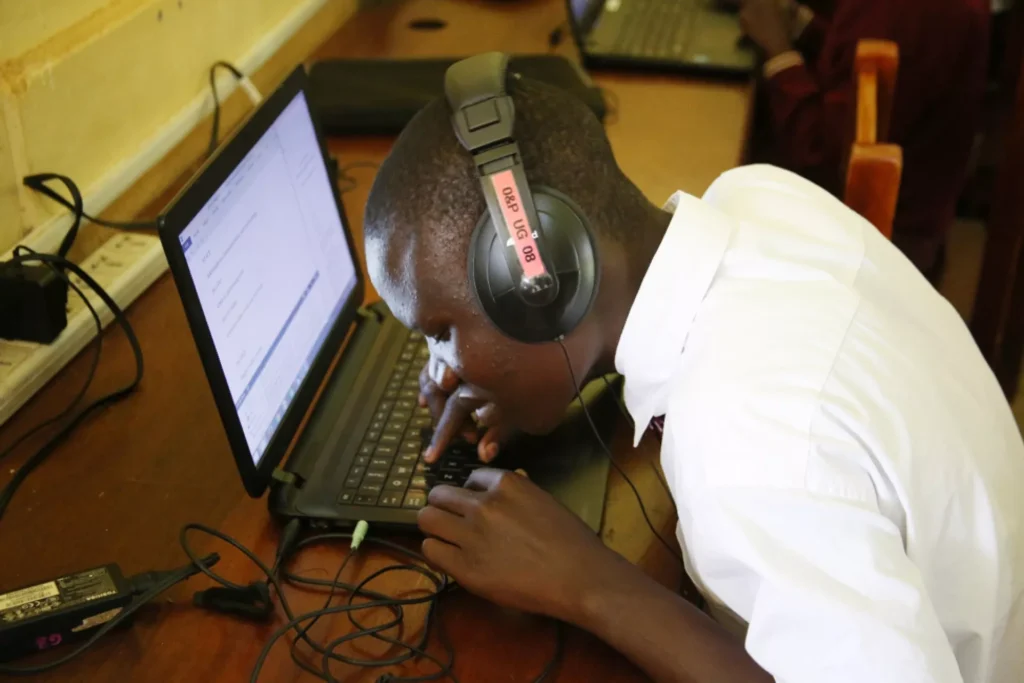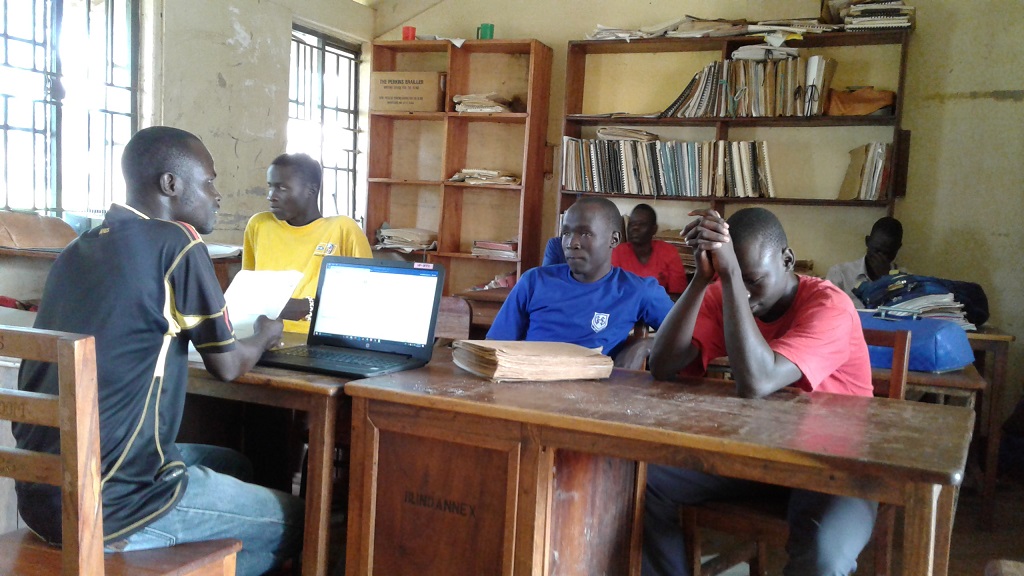Gulu High School Success Story

When George Ntakimanye, a 14-year old student who is blind was introduced to computers at Gulu High School in Senior One in 2019, little did his teachers know that something they had never experienced was about to happen. He had joined from Kamurasi Demonstration Primary School in Masindi where he had created a reputation as a gifted student. However, his teachers didn’t think that he would lead to a change in the way students who are blind sit their exams. Ntakimanye is blind but learned computers faster than most students of his age and disability. It usually took a year at Gulu High School for students who are blind to master computers and be able to sit their exams. Doing exams on computers was always reserved for students in their second year and above. Those in Senior One did mainly oral exams. Teachers were shocked when Ntakimanye told them that he should be given a chance to do his examinations on a computer. “We knew he was capable but we thought for exams he should wait. He continued advocating for it until we agreed,” says Kenneth Samuel Owiny, the Exams Secretary at Gulu High’s Blind Annex. “He passed his exams very well and came top of his class in entrepreneurship. We are an inclusive school, so he beat students without disabilities,” Owiny, who is also blind, adds with a broad smile. “We are very proud of not only George but Jane as well,” he adds. Jane Drichiru, like Ntakimanye, was a pupil at Kamurasi Demonstration Primary School in Masindi District in Mid-Western Uganda where UNICEF implemented the Provision of Accessible Learning Materials for Children with Visual and Hearing Impairment in Primary Schools Project for three years. When both passed their national primary education, their guardian enrolled them at Gulu High School in Northern Uganda. Although the school has had aunit for students who are blind since the mid-1980s, it has been neglected for years. However, it has been revamped with support from the Joint project between UNICEF and UNESCO funded by the United Nations Partnership on the Rights of Persons with Disabilities who have provided computers installed with software for the students who are blind or have low vision. Ntakimanye and Drichiru are two out of 17 students who are blind or have low vision at Gulu High, a school with a student population of about 500. Every student who is blind or have low vision has access to a laptop where she/he does her/his projects and revisions. Ntakimanye says: “The books are not enough though. We need more,” Drichiru and Ntakimanye have not only excelled with academics, but they are also part of the school’s Paralympics team. At the recent national Paralympics championship in Mpigi District in central Uganda, Drichiru won a bronze medal in the 400 metre category while Ntakimanye was fifth in the 800 metre category. Both students have integrated very well into their secondary school life where they have made new friends but still, keep in touch with teachers at Kamurasi. “Tell teacher Joy to visit us like she did last time,” Drichiru, who is jovial throughout the interview says after which she leans back and then puts on a straight face. The smile is gone and something seems to be bothering her. She immediately lets it out. “I want my friends at Kamurasi to work hard and join me here to continue with their education. I have learnt how to use a computer and one day, I will become a lawyer.” At the speed she was typing her work earlier in the computer laboratory, there is no doubt that she won’t be able to go through a pile of files quickly enough to find evidence to represent her clients.
Spelling quiz for blind students

Increasing Knowledge of Blind Students through Spelling Quizzes and Group Revisions Oysters & Pearls-Uganda has initiated a weekly quiz competition at Gulu High School to improve the grades of Blind Annex students. The initiative, which was kicked off this year by Ojukul Francis (O&P-UG Project Coordinator), sets students in groups of four. Each group is comprised of students chosen from senior one up to senior six. The winning group gets a prize at the end of the session. Students who are educated using a Brailler typically do not receive corrective feedback on the writing skills, including grammer and spelling, because their sighted teachers often cannot read Braille. Their spelling is poor as a result and words are written phonetically. Nonetheless, they are enthusiastically joining in on quiz day to sharpen spelling and compete to answer questions from past exams to ensure the best possible performance on exams. Francis says he received numerous complaints from the blind students that sighted teachers were not spelling words for them during class which is majority sighted, ignoring the fact that they cannot see the blackboard. “The spelling quiz competition is not only making the students improve their spellings, but also to think fast, because each group is given only ten seconds to answer a question,” Francis said. Odoch Daniel, Head of the Special Needs Unit at Gulu High School reaffirms the advantages of the spelling quizzes to the blind students. Daniel says the exercise is vital to blind students who use advanced braille, grade II. The Grade ll braille contracts words for quicker typing. For instance, the word knowledge is written as K, and pronounced in full. The word people is written as P, but pronounced as a full word. Daniel notes that the spelling quizzes are enabling students to be in constant touch with words, so that their national examination grades are not affected because of misspellings. He adds that; “Since we introduced ICT, we expect students to spell out words in full, not in contracted form”. He states that the spelling exercises are encouraging the shy students to speak up, and with confidence. “Putting the students in small groups encourages participation and team work. Since the groups are very small, each of them is forced to talk”. “And of course, the prize encourages each member to cooperate, so that their group wins”. Daniel says the unit also plans to form debating teams of the blind and visually impaired students soon. He believes that the debating competitions will enable the students to sharpen critical thinking skills and articulate issues without fear, and also perfect their public speaking skills. Group Revisions The organization has also come up with a group-revision system. During the group revisions, the students respond to questions taken from past national examinations in order to prepare them for forthcoming national examinations. Francis Ojukul said the practice reduces the anxiety and fear of national examinations by acquainting the students with the kind of questions set in national examinations. Odoch Daniel said the group revision can also include questions from subjects they are not studying, to encourage them to read widely and to be well informed. In Uganda, blind students are kept from studying subjects like Chemistry, Geography, Biology and Physics due to lack of access to academic material such as map reading and advanced talking calculators. Blind students with interest and natural aptitude for these subjects study them in other countries where assistive materials and devices make the content accessible.
